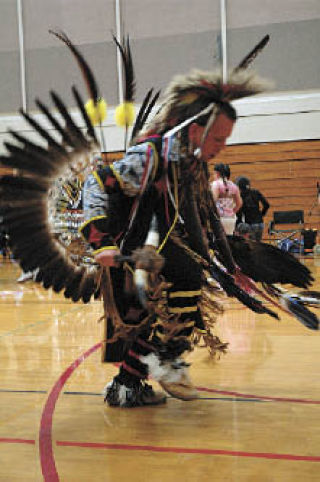MARYSVILLE — There were perhaps as many different perspectives on Totem Middle School’s second annual Veterans’ Pow Wow as there were attendees.
Members of the Tulalip Tribes were joined by tribal members from as far north as Canada and as far east as Montana in dancing, singing and drumming for four hours Nov. 15, after a free dinner.
Robert Brien is a Crow Indian who’s attended pow wows in the local area since 1998, and he served as arena director of the Veterans’ Pow Wow Nov. 15. For him, the pow wows have more to do with community and tradition than with spirituality.
“It’s not so much religious significance as it is just a gathering of people, coming together to enjoy each other’s company,” Brien said. “Long ago, when tribes would visit each other, they’d stop three or four miles out, style their hair and put on their buckskins, beads and other finery, and parade into one another’s camps to show off what they had.”
Brien recalled how pow wows were once banned, and practiced in secret in individuals’ homes because of mandated “cultural assimilation.”
“A whole generation was lost,” Brien said. “We call them the ‘short-hair generation.’ They weren’t even allowed to learn their own language in school. All our teachings are tied up in our language.”
Brien also pointed out how migration of tribal populations caused pow wows to spread during the 20th century.
“Pow wows were a function of the plains tribes, but with World War II, a lot of service people came west, to the Army and Navy bases,” Brien said. “While they were stationed here, they wanted to continue what they’d practiced back home, and they taught it to the West Coast tribes. The West Coast tribes are people of the canoe, the smokehouse and the longhouse.”
An army veteran who was initiated into pow wows by his grandfather at the age of 4, Brien explained how the Veterans’ Pow Wow reflects a modern iteration of a long-standing tradition.
“All Native American tribes revered their warriors as protectors, and in almost every tribe, that’s transferred over to the veterans,” Brien said.
Two members of the Canadian Thunderchild drum group harbor differing, but compatible, views of the regional pow wows that they’ve taken part in.
Ray Thunderchild, a Cree Indian who hails from Saskatchewan, is the latest man in his family to lead the drum group, which has lasted five generations. To him, the performance is what matters most.
“I keep politics out of it,” Thunderchild said. “For me, it’s all about the passion of singing. It’s the only way of life I’ve ever known. Pow wow life is the only way to live.”
Thunderchild treasures the experiences he’s had, being able to meet members of different tribes, and to see different areas and “beautiful women,” he added with a laugh.
Glenn Zapton, a Mohawk Indian from Ontario, admitted that pow wows are not in the “style” of the Mohawk tribe, but he participates in them to help “bring back the culture” of Native American tribes as a whole.
For Tulalip Tribes Color Guard member William McLean Jr., the pow wow was a welcome opportunity to receive thanks for his service. McLean’s grandfather served in the Army in WWII, and McLean himself is the second of three generations of his family to serve in the Marine Corps.
“I was in the first Gulf War,” McLean said. “My dad was in Vietnam, and my son just came back from his second tour in Iraq. My son served in the same unit as my dad. He’s got some horror stories, but he saved his crew. Native Americans step up to do their duty and defend their country.”
McLean sees the pow wow as a “spiritual healing” event, noting that the praise which active duty service members receive does not always transfer over to former service members.
“It’s nice to have people shaking your hand and telling you they appreciate that you served,” McLean said. “It’s neat for kids like my younger boys to see how much service members are respected. They both want to be Marines now.”



